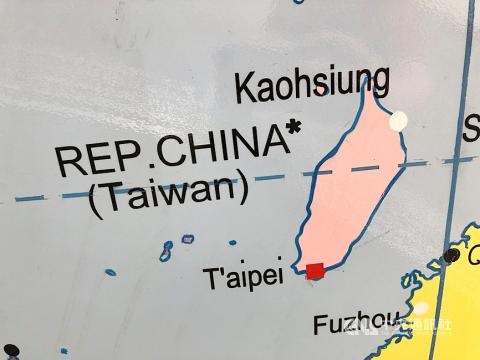The Ministry of Foreign Affairs yesterday applauded the London School of Economics and Political Science (LSE) for not changing the color of Taiwan on a sculpture of the globe on its campus, saying the decision tallies with the cross-strait “status quo.”
The university on March 26 unveiled the sculpture, titled The World Turned Upside Down by the Turner Prize-winning artist Mark Wallinger, outside its Saw Swee Hock Student Centre.
It is a political globe, 4m in diameter, with nation states and borders outlined, but with “the revolutionary twist of being inverted,” the university’s Web site says.

Photo: CNA
On the sculpture, Taiwan is labeled “Rep. China* (Taiwan)” and colored pink, while China is labeled “China (People’s Republic)” and colored yellow.
The representation irked the university’s Chinese students, who demanded that Taiwan and China be painted the same color, while Taiwanese students submitted a petition with more than 10,000 signatures urging the school to keep the original design.
The school in April said it was consulting experts and mulling changes to the sculpture, but later decided to retain the original design and erected a placard next to it.
“LSE is a place where people with different perspectives engage in respectful debate about major issues for the world,” the placard reads.
“The designated borders, colours, and place names do not imply endorsement by LSE concerning the legal status of any territory or borders,” it says. “There are many disputed borders and the artist has indicated some of these with an asterisk.”
An asterisk was placed beside Taiwan, as well as Palestine, which is entangled in territorial disputes with Israel.
The decision not only respects the artist’s original vision, but also reflects the “status quo” across the Taiwan Strait, the ministry said in a statement.
Many British lawmakers, academics and opinion leaders over the past few months have been calling on the school to maintain the artwork as is, the ministry said, expressing gratitude for their attention to the incident.
Minister of Foreign Affairs Joseph Wu (吳釗燮) on April 5 penned an open letter to LSE director Minouche Shafik, calling on the school not to change the artistic design due to Beijing’s pressure.
LSE has inspired many young Taiwanese in the pursuit of academic excellence and President Tsai Ing-wen (蔡英文) has always been proud of her LSE experience, Wu wrote.
Additional reporting by CNA

SECURITY: As China is ‘reshaping’ Hong Kong’s population, Taiwan must raise the eligibility threshold for applications from Hong Kongers, Chiu Chui-cheng said When Hong Kong and Macau citizens apply for residency in Taiwan, it would be under a new category that includes a “national security observation period,” Mainland Affairs Council (MAC) Minister Chiu Chui-cheng (邱垂正) said yesterday. President William Lai (賴清德) on March 13 announced 17 strategies to counter China’s aggression toward Taiwan, including incorporating national security considerations into the review process for residency applications from Hong Kong and Macau citizens. The situation in Hong Kong is constantly changing, Chiu said to media yesterday on the sidelines of the Taipei Technology Run hosted by the Taipei Neihu Technology Park Development Association. With

CARROT AND STICK: While unrelenting in its military threats, China attracted nearly 40,000 Taiwanese to over 400 business events last year Nearly 40,000 Taiwanese last year joined industry events in China, such as conferences and trade fairs, supported by the Chinese government, a study showed yesterday, as Beijing ramps up a charm offensive toward Taipei alongside military pressure. China has long taken a carrot-and-stick approach to Taiwan, threatening it with the prospect of military action while reaching out to those it believes are amenable to Beijing’s point of view. Taiwanese security officials are wary of what they see as Beijing’s influence campaigns to sway public opinion after Taipei and Beijing gradually resumed travel links halted by the COVID-19 pandemic, but the scale of

A US Marine Corps regiment equipped with Naval Strike Missiles (NSM) is set to participate in the upcoming Balikatan 25 exercise in the Luzon Strait, marking the system’s first-ever deployment in the Philippines. US and Philippine officials have separately confirmed that the Navy Marine Expeditionary Ship Interdiction System (NMESIS) — the mobile launch platform for the Naval Strike Missile — would take part in the joint exercise. The missiles are being deployed to “a strategic first island chain chokepoint” in the waters between Taiwan proper and the Philippines, US-based Naval News reported. “The Luzon Strait and Bashi Channel represent a critical access

Pope Francis is be laid to rest on Saturday after lying in state for three days in St Peter’s Basilica, where the faithful are expected to flock to pay their respects to history’s first Latin American pontiff. The cardinals met yesterday in the Vatican’s synod hall to chart the next steps before a conclave begins to choose Francis’ successor, as condolences poured in from around the world. According to current norms, the conclave must begin between May 5 and 10. The cardinals set the funeral for Saturday at 10am in St Peter’s Square, to be celebrated by the dean of the College